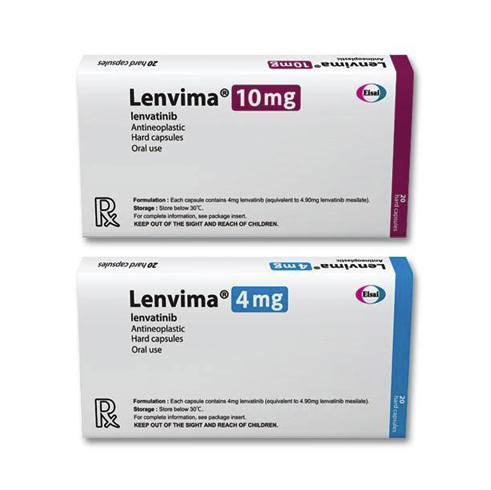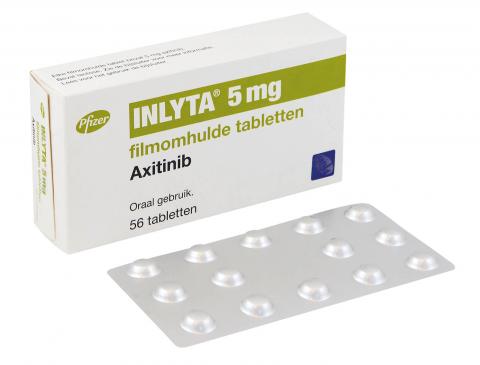Lenvima (lenvatinib) vs Inlyta (axitinib)
Lenvima (lenvatinib) vs Inlyta (axitinib)
Lenvima (lenvatinib) and Inlyta (axitinib) are both oral medications used to treat certain types of cancer, but they have different mechanisms of action. Lenvima is a multikinase inhibitor that can interfere with various pathways to slow the growth of cancer cells, and it is commonly used to treat thyroid cancer, kidney cancer, and liver cancer. In contrast, Inlyta specifically inhibits tyrosine kinases associated with angiogenesis, and is primarily used for the treatment of advanced renal cell carcinoma (kidney cancer) after failure of one prior systemic therapy. When deciding between the two, it is important to consult with a healthcare provider to consider the specific type of cancer being treated, previous treatments, potential side effects, and the overall health of the patient.
Difference between Lenvima and Inlyta
| Metric | Lenvima (lenvatinib) | Inlyta (axitinib) |
|---|---|---|
| Generic name | Lenvatinib | Axitinib |
| Indications | Thyroid cancer, Renal cell carcinoma, Hepatocellular carcinoma | Renal cell carcinoma |
| Mechanism of action | Receptor tyrosine kinase inhibitor | Receptor tyrosine kinase inhibitor |
| Brand names | Lenvima | Inlyta |
| Administrative route | Oral | Oral |
| Side effects | Hypertension, Diarrhea, Fatigue, Decreased appetite, Weight loss, Joint/muscle pain | Diarrhea, Hypertension, Fatigue, Nausea, Dysphonia, Hand-foot syndrome |
| Contraindications | Hypersensitivity to lenvatinib or excipients | Hypersensitivity to axitinib or any component of the product |
| Drug class | Multikinase inhibitor | Tyrosine kinase inhibitor |
| Manufacturer | Eisai Co., Ltd. | Pfizer Inc. |
Efficacy
Lenvima (lenvatinib) Efficacy in Kidney Cancer
Lenvima, also known by its generic name lenvatinib, is a medication that has shown efficacy in the treatment of kidney cancer, specifically in patients with advanced renal cell carcinoma (RCC). Lenvatinib is a type of drug known as a tyrosine kinase inhibitor (TKI), which works by blocking certain proteins that promote the growth of cancer cells. In the context of kidney cancer, lenvatinib is often used in combination with everolimus, another cancer medication, and this combination has been found to improve progression-free survival compared to everolimus alone.
Inlyta (axitinib) Efficacy in Kidney Cancer
Inlyta, or axitinib, is another TKI that is approved for the treatment of advanced RCC after failure of one prior systemic therapy. Axitinib works by selectively inhibiting vascular endothelial growth factor receptors (VEGFRs), which play a key role in the angiogenesis process that tumors utilize to grow and metastasize. Clinical trials have demonstrated that axitinib can significantly extend progression-free survival in comparison to sorafenib, another TKI, in patients with advanced RCC who have previously been treated with one systemic therapy.
Comparative Efficacy in Clinical Trials
Comparative studies and clinical trials have been conducted to evaluate the efficacy of lenvatinib and axitinib in the treatment of kidney cancer. For instance, a phase II study comparing lenvatinib in combination with everolimus to lenvatinib alone and to everolimus alone in patients with metastatic RCC showed that the combination provided a significant improvement in progression-free survival. Similarly, axitinib has been evaluated in various phase III trials, which have confirmed its efficacy in improving outcomes for patients with advanced RCC, particularly after the failure of prior treatment.
Conclusion on Efficacy
Both Lenvima (lenvatinib) and Inlyta (axitinib) have been shown to be effective treatments for advanced kidney cancer, improving progression-free survival in patients with advanced RCC. Lenvatinib is often used in combination with everolimus, while axitinib is used after failure of one prior systemic therapy. The choice between these medications can depend on several factors, including the patient's previous treatments, the side effect profile of the drugs, and the patient's overall health status. It is essential for healthcare providers to consider individual patient needs and the latest clinical evidence when recommending these therapies for the treatment of kidney cancer.
Regulatory Agency Approvals
Lenvima
-
European Medical Agency (EMA), European Union

-
Food and Drug Administration (FDA), USA

-
Health Canada

-
Pharmaceuticals and Medical Devices Agency (PMDA), Japan

-
Therapeutic Goods Administration (TGA), Australia

Inlyta
-
European Medical Agency (EMA), European Union

-
Food and Drug Administration (FDA), USA

Access Lenvima or Inlyta today
If Lenvima or Inlyta are not approved or available in your country (e.g. due to supply issues), you can access them via Everyone.org.
How it works

Make an enquiry
Choose the medicine you want to buy, answer a couple of questions, and upload your prescription to speed things up. We’ll get back to you within 24 hours.


Make an enquiry
Choose the medicine you want to buy, answer a couple of questions, and upload your prescription to speed things up. We’ll get back to you within 24 hours.


Breeze through the paperwork
We'll guide you through the required documents for importing unapproved medicine, ensuring you have all the necessary information.


Get a personalized quote
We’ll prepare a quote for you, including medicine costs and any shipping, administrative, or import fees that may apply.


Receive your medicine
Accept the quote and we’ll handle the rest - sourcing and safely delivering your medicine.

Some text on this page has been automatically generated. Speak to your physician before you start a new treatment or medication.
Let's talk
If you have any questions, call us or send us a message through WhatsApp or email:
Contact us




